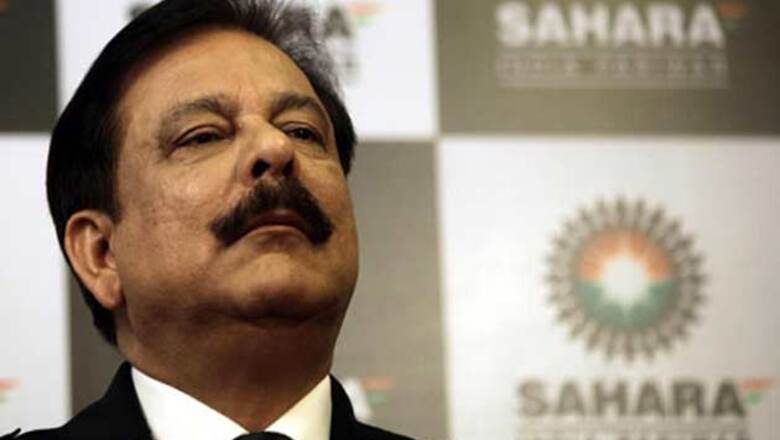
views
New Delhi: In the high profile Sahara case involving over Rs 24,000 crore raised through "various illegalities", market regulator SEBI has begun the process of refund to individual investors who have been verified by it. The money is being refunded only in those cases where SEBI has not found any multiplicity during its verification process. Refund for others will have to wait till the next direction from the Supreme Court, which is likely to hear the case on July 17.
The refunds are being made from Rs 5,120 crore that has been deposited by the Sahara group, which claims to have already returned close to Rs 20,000 crore to the bondholders of two Sahara firms directly. This claim of direct refunds, which Sahara says were made before the Supreme Court order of August 31, 2012, is yet to be verified independently, sources said.
Even among the lists of investors submitted by Sahara to SEBI, after being directed by the apex court to do so, the regulator has come across numerous multiplicities and other anomalies, sources said.
There are numerous instances of one investor being named at hundreds of places, while there are also cases of multiple addresses for one single investor and hundreds of investors sharing the same address, sources said.
However, the largest number of anomalies suspected by SEBI involves untraceable addresses and other investor details. Sources said the refunds are being made to the genuine investors whose credentials have been verified, although the number of such cases is so far very small when compared to initial claims of about 3 crore bondholders from whom two Sahara firms had raised over Rs 24,000 crore.
The refunds, if any, to the 'genuine' investors finding multiple mentions in Saharas' list would be made after further probe into these details and a subsequent direction from the Supreme Court in this regard, as SEBI suspects that there might be some manipulation on the part of the companies.
SEBI has already written to Enforcement Directorate, RBI and other government agencies to look into possible violations of rules by Saharas in this matter, including any money laundering activities through fictitious entities.
However, the regulator is going ahead with the process of refunding the money to genuine individual investors, sources said.
During the last hearing of Supreme Court in this case, SEBI's counsel Arvind Datar submitted that "the money so far deposited by Saharas be permitted to be refunded to the genuine investors, with interest, after verifying the genuineness of the documents," as per the court order of May 8.
To this, the apex court had said that "SEBI may do so". However, the issue of "genuine multiple investors" would be examined on the next date of hearing, it said, while posting the matter for July 17.
SEBI has also filed a contempt petition against Saharas, accusing them of not following court directions, while it has also sought orders for arrest of group chief Subrata Roy and his debarment from leaving the country. These matters are also likely to be heard by the court on July 17.
SEBI is already believed to have incurred huge costs, including initial expenses of about Rs 56 crore for putting in place storage, scanning and repayment systems, for the humongous task of facilitating Rs 24,000-crore refund to bondholders of two Sahara firms after verifying their credentials.
It is Saharas that will have to clear all these bills. The final expense bill in this high-profile case could be much higher, as just two contracts - for storage and scanning of investor documents and for providing platform to facilitate redemption related services - have cost it Rs 55.85 crore.
SEBI had contracted Stock Holding Corporation of India (SHCIL) for the work relating to storage, digitisation and scanning of investor documents and for creation of a database. This contract was worth Rs 25.97 crore. Besides, another contract of Rs 29.88 crore was given to UTI Infrastructure Technology & Services for the work relating to redemption related activities in this case.
The Supreme Court has also appointed a retired judge to oversee the matter at a monthly remuneration of Rs five lakh in addition to travelling, accommodation and other expenses, all of which are borne by SEBI and recoverable from Saharas.
All the administrative expenses including payments to the additional staff and experts, would also be borne by Saharas. Sahara group claims that it has already repaid a vast majority of the investors and its total outstanding liability towards the bondholders is much less than Rs 5,120 crore given by it to SEBI towards the refund process.
After Sahara firms were told by the Supreme Court to hand over the investor documents to SEBI, the group sent 128 trucks with more than 31,000 cartons of papers to the regulatory authority's headquarters in Mumbai. Finding it impossible to store them at any of its offices, SEBI decided to keep them at a warehouse of SHCIL Projects Ltd, a subsidiary of SHCIL.
The Navi Mumbai warehouse, having 32 lakh cubic feet of storage capacity, has automatic robotic systems for handing of documents and their storage in safe vaults. In its order dated August 31, 2012, the Supreme Court had allowed SEBI to engage investigators, other experts and supporting staff for investor verification and the refund processes. The court had also ruled that all these expenses would be borne by Saharas and be paid to SEBI.




















Comments
0 comment